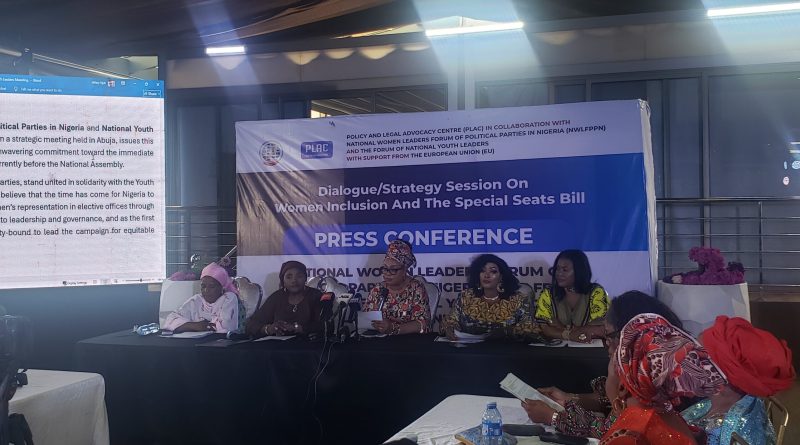Women, youth leaders renew call for passage of Special Seats Bill
Women and youth leaders of Nigeria’s registered political parties have renewed calls for the immediate passage of the Reserved Seats for Women Bill, which is currently before the National Assembly.
Speaking at a joint press briefing in Abuja on Tuesday, the Forum of National Women Leaders of Political Parties in Nigeria, in collaboration with the National Youth Leaders of Political Parties, described the bill as a national imperative aimed at correcting long-standing gender imbalances and ensuring that women can express strong support for the proposed constitutional amendment.
Speaking at the event, the President of the Forum, Amina Bryhm, said the bill is not just legislation but a rallying point for justice, democracy, and nation-building.
Ms Bryhm said it is imperative for the bill to be passed without further delay.
“We declare that the Reserved Seats for Women Bill must be passed now, not tomorrow, not later, but now,” she said.
The group urged lawmakers to make history by passing the bill and called on President Bola Tinubu and the executive arm of government to give their full support and assent once the National Assembly passes it.
According to the forum, the bill seeks to institutionalise women’s representation in elective offices and ensure more inclusive governance.
It pledged to intensify sensitisation within political parties and engage grassroots members to build wider support for the legislation.
Cross-party collaboration
Responding to questions from journalists, Ms Bryhm said the creation of the National Women Leaders Forum had already strengthened collaboration among women from different political parties.
“While we are in different political parties, we have already identified the strong women who have the capacity, who have the ability to run on these seats,” she said.
“And at the end of the day, we will have one woman coming out to represent all the women when they are voted in for.”
Saudatu Abdullahi, national publicity secretary of the forum, said all 19 registered political parties were represented in the alliance.
Ms Abdullahi added that women leaders had agreed to support strong, competent female candidates regardless of party affiliation once the bill is passed.
She said, “This is not about political parties, it’s about the women being represented at the National Assembly, and we are going to do it.”
‘We will do things differently’
Ms Bryhm said that inclusion is the first step in what women intend to bring to governance.
“Before you ask what we’ll do differently, at least let us sit at the table. We can’t even negotiate if we are not seated. Once women are represented, our voices will be amplified.”
She said women leaders were already identifying competent candidates and ensuring they meet all eligibility standards to avoid post-election litigations.
“We’re putting our best foot forward. Any woman contesting must be ready to campaign, meet voters, and present her manifesto,” she said.
The financial secretary of the forum, Anita Chukwu, also said women would bring greater accountability to governance.
“If there’s one specialist in accountability, it’s the woman. We will ensure every resource given to our constituencies is used properly,” Ms Chukwu said.
Reframing the past
Participants also addressed recurring references to Sarah Jibril, Nigeria’s first female presidential aspirant, who was the only one to vote for herself at her party’s primary years ago.
Elizabeth Nwokeoche, the organising secretary, said Mrs Jibril’s courage paved the way for others, noting that her attempt encouraged many women to step forward.
Ms Nwokeoche added that the newly formed Forum would prevent such isolation of female aspirants.
“We’ve agreed that any woman with the capacity to represent us will get collective support, no matter her party,” she said.
Ms Bryhm expressed concern about the low number of women in elective positions nationwide.
She said, “Out of 360 House members, just 16 are women. In 16 states, there’s not a single woman in the assembly. Out of about 900 state legislators nationwide, only 55 are women. Does that look good for a country that calls itself the giant of Africa?”
She added that passing the bill would bring Nigeria closer to international standards on gender inclusion and reflect its democratic values.
The forum said it would continue mobilising women’s groups, civil society, traditional rulers, and the media to push for the bill’s passage.
It also appealed for continued support from development partners to amplify advocacy and technical engagement.
Reserved seats for women bill
The Reserved Seats for Women Bill is a proposed legislation that seeks to create special seats exclusively for women in Nigeria’s national and state legislatures to address the country’s abysmally low female representation in politics.
Nigerian women occupy less than five per cent of seats in the National Assembly, which is far below the African Union’s 50 per cent parity target and the global average of 26.5 per cent. In the 10th Assembly (2023–2027), women hold only 17 out of 469 seats (about 3.6 per cent), which has dropped compared to previous parliaments.
READ ALSO: Women leaders push for reserved seats bill, collective political power
The bill is before the National Assembly and is designed as a temporary measure, with a provision that it will last for 16 years, covering four election cycles, after which it will be subject to review.
It has passed its Second Reading at the House of Representatives and will require approval by two-thirds of members in both chambers, as well as endorsement by at least 24 state assemblies, before it can be sent to the president for assent.


